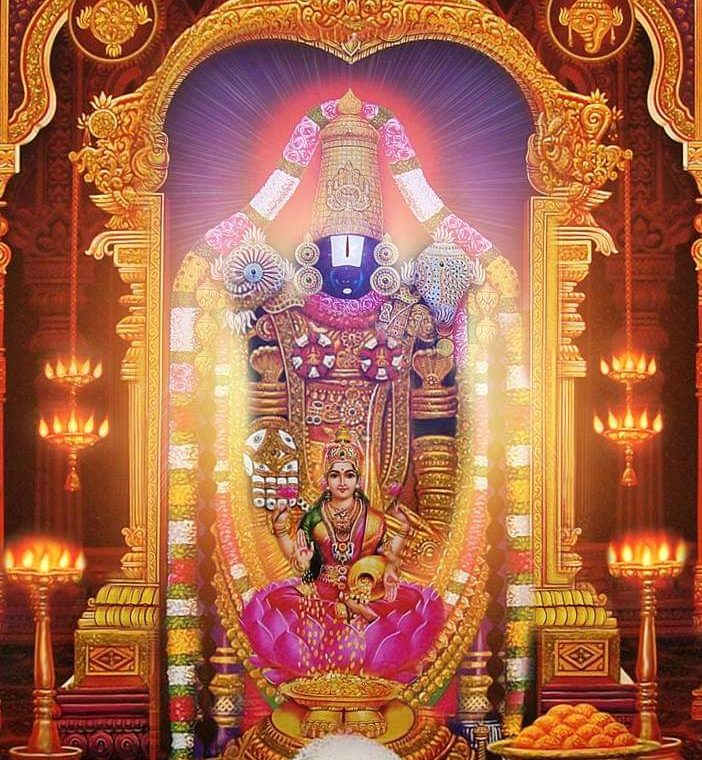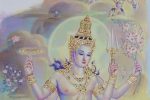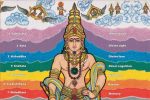NAME 60
Prabhūtaḥ- प्रभूतः
Prabhūta means abundance. He is abundant in anything. From Him alone, everything originates. He is an embodiment of abundance.
Prabhootah – One who is endowed with Greatness
One who is affluent, ever-full, and well-endowed with wisdom, greatness, and other qualities.
Literally this means ‘born full or perfect’ or a ‘Super-Being’. Sri Adi Sankara says ‘Gnanaa Aishvaryaadibhih Gunaihi Sampannah Prabhootah – One enriched with divine attributes such as Wisdom and Godliness’. He is well endowed with Gnana, Aishvarya, Bala, Veerya, Shakti and Tejas i.e, the Shat-Gunas, all intact even at the time of dissolution of the Universe. He who Just as an invisible string threads a necklace of pearls, the hand of the Supreme orchestrates the cosmic order.
He is affluent and well endowed with greatness and so He is called Prabhootah.
Beyond the impersonal and localised aspect of the Supreme, there lies the personal aspect known as bhagavan, the all-attractive Supreme person known as Sri Krishna. Yes! God is ultimately a person, though not like you and me. He is the source of everything that exists. In other words, everything is the property of Sri Krishna and everyone is the beloved child of Sri Krishna. Vishnu is the Supreme Isvara – Just as an invisible string threads a necklace of pearls, the hand of the Supreme orchestrates the cosmic order.
६०. ॐ प्रभूताय नमः |
60. OM Prabhūtāya Namaḥ
Prabhootah -The term means ‘born full’ or ‘ever-full’. He is ever-full and perfect in His Essential Nature, as the Transcendental Reality, or even when He manifests in the form of His various incarnations. Especially in His chief and glorious incarnation as Lord Krishna, He proved Himself to be ever full with His Omnipotency and Omnisciency.
Jñānaiśvaryādi guṇaiḥ saṃpannaḥ Abundantly endowed with the qualities of wisdom, eminence etc..
He is affluent and well endowed with greatness and so He is called Prabhootah.
INTERPRETATION GUIDED BY SANT VANI (WORDS OF SAINTS)
Prabhūtaḥ
The one abundantly endowed (with special qualities).
He who is very wealthy, the treasure-house, rich beyond measure, the great eminence – because he is the owner of the immeasurable Parama-pada – the highest attainable state which is his very being and that which only he can bestow.
He is Prabhūta because He is abundantly endowed with special qualities in absolute measure.
You will notice that we use the word Bhagavan or Ishvara more than the word God. In the Viṣhṇu Purāṇa, there is a beautiful verse explaining the six fold virtues, bhaga of Bhagavan.
The one who has bhaga is Bhagavān just as the one who has dhan, wealth is dhanavān. These six fold virtues are jnāna, all knowledge; vairāgya, total dispassion; the capacity to create, sustain and dissolve, vīrya; absolute fame, yaśas; all wealth, śrī; and over lordship, aiśvarya.
To have all knowledge, jnāna is to be free from all ignorance, Hence the being does not require a mind, perception or a means of knowledge with which to know, Knowledge at some time, is preceded by ignorance in a human mind. This is not required for Bhagavān. All the sciences that we study are just a peek into the knowledge that is Bhagavān.
The one who has absolute dispassion, vairāgya has no longing, no insecurity as he or she is always full. Vīrya is absolute power or sakti to create, sustain and dissolve.
Absolute fame, yaśas is all fame, including my own or anybody else’s. One who speaks
eloquently may gain some fame, but that is just a ray of glory of the Lord. To sustain the jagat, many resources are required. Any wealth and resources that anyone may have (including all the people on the Forbes list of the richest people all these years) really is a miniscule fraction of Bhagavān’s wealth and we are only trustees. If the wealth really belonged to us, we would take it with us even after death.
Finally, the one who is not supervised, ruled, coached or mentored by anyone, not subject to the laws of anyone, has aiśvarya, over lordship. We, as individuals, function according to the laws of our place, we cannot go against them. Even an engineer who is responsible for executing a project cannot touch a live wire without facing consequences. In fact, it is because of the laws that electricity was generated to be used in the first place. But it cannot be abused. Thus, the one who is not subject to the laws of anyone is Bhagavān.
We are naturally drawn to people who have qualities that we admire, desire and respect. Infact, we find that the more we discover their sterling qualities, our affection and fondness for these people grows. In many cases, dwelling on these desirable qualities of the person makes us love them. And if we are able to relate to these people, depend on them and know that we are totally acceptable in their eyes and they are responsible for our sustenance, then things start to change.
In our recognition we are transformed. When we surrender to an altar that we understand as Bhagavān, we are altered.
This name is a reference to that Supreme being who is ‘ever-full‘, there is nothing that he does not have and there is nothing he expects from others, and nothing that anyone can offer him that he already does not have – It is he who gives, there is nothing that we have to offer to him, other than Bhaktī (devotion that is devoid of any expectations).
This reminds me of a beautiful line from the famous aarti of Bhagwan:
“swami sab kuch hai tera
tera tujhko arpan, tera tujhko arpan
kya lage mera
As he is that treasure-house that never depletes and is ever-full he is Prabhūtāḥ. He is Paripūrṇa – complete in all aspects and Sarva-Guna-Saṃpanna (supreme storehouse of all that is good) – therefore though he is forever giving, he never depletes.
Connecting this name to the earlier names, we see how the string makes so much sense:
Kṛṣṇa – who is the epitome Sacchidānanda – “sat“, “chit” and “ananda” and who has the quality of ākarṣaṇa (attraction) and delights in the sport of his own Līlā – the divine play.
Lohitākṣa – whose eyes are rose-tinged reflecting the great joy that ‘he’ is and who has compassion and love for his devotees
Pratardanaḥ – who tears and removes the illusory veil of Māyā…
He can do all of the above, because he is Prabhūtāḥ – the treasure-house that never depletes – who is forever giving and expects nothing but pure devotion.
As that Paripūrṇa–Sarva-Guna-Saṃpanna–avatāra, Kṛṣṇa says in the Bhagavad-gītā:
पत्रं पुष्पं फलं तोयं यो मे भक्त्या प्रयच्छति |
तदहं भक्त्युपहृतमश्नामि प्रयतात्मन: || 9-26||
patraṁ puṣhpaṁ phalaṁ toyaṁ yo me bhaktyā prayachchhati
tadahaṁ bhaktyupahṛitam aśhnāmi prayatātmanaḥ.
“A leaf, a flower, a fruit (patraṁ puṣhpaṁ phalaṁ) and if none of these are available, just some water (toyaṁ) offered to me in complete devotion, I delightfully accept/partake (aśhnāmi), provided it is offered by one from his very Ātman and in the spirit of pure consciousness (prayatātmanaḥ)”
This exact verse as in Bhagwat Geeta, is also seen in the Śrīmad Bhāgavatam when Kṛṣṇa says this to his friend Sudāmā (also known as Kuchela), even as he munches on the fistful of beaten rice that his friend had got for him – that is all that Sudāmā could offer, but what he got in return was immeasurable…



